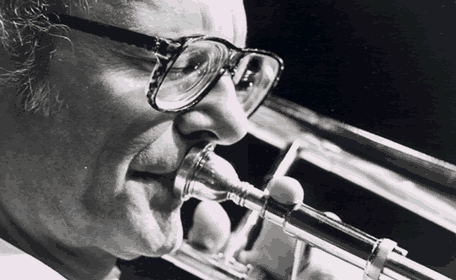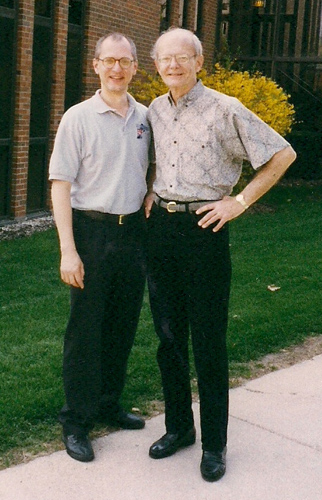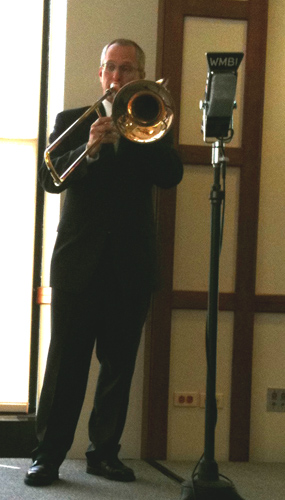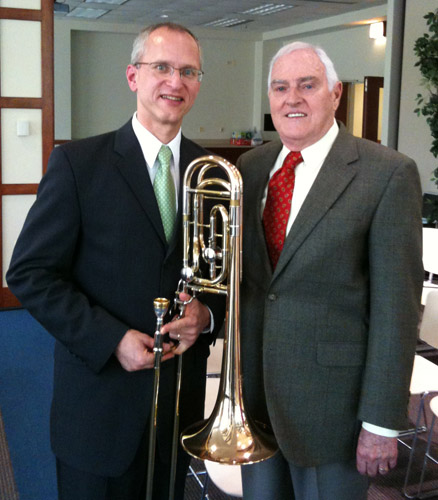 |
 |


On May 22, 2010, I was privileged to attend a memorial service for my friend, Bill Pearce. Bill, who died in February of this year at the age of 83, was well known as host of the Christian radio program, NIGHTSOUNDS, and was also one of the finest trombonists who ever lived. His influence on me is incalcuable, and I was pleased to be asked to both play several of Bill's trombone arrangements and speak at this memorial service. The service was held at Moody Bible Institute in Chicago where Bill got his start in radio after his discharge from the U.S. Marine Corps after World War II.
The service was organized by Brad Walton of the Nightsounds Board of Directors. Burt Kettinger opened the service with reflections about Bill, and what followed were tributes in words, video and music from Phil Shappard (of WMBI/Moody Broadcasting - Phil delivered the Eulogy), Gary Keller, Bill's long time musical collaborators Dick Anthony and Kurt Kaiser (who improvised a beautiful rendition of "God Be With You Until We Meet Again" on the piano before he gave the benediction), piano reflections by H. E. Singley, and my playing of trombone solos (accompanied by H. E. Singley) and giving the Homily (which appears below). It was a joy to see so many others in attendance - including Larry Mayfield, Glenn Jorian and Gill Mead - who worked with Bill and were also touched by his life and ministry. I left Chicago bouyed and encouraged, inspired once again by the person of Bill Pearce whose legacy continues through the many lives he touched and changed, including my own.
For those interested in knowing more about Bill Pearce, visit the following links:
To read the interview of Bill Pearce I did for the Online Trombone Journal, click HERE.
To read the tribute to Bill Pearce that appears on my website (entry for February 25, 2010), click HERE.
 A few years ago, when Bill was in the nursing home in Lancaster, Pennsylvania - Parkinson's Disease continuing its long debilitating march against his body - he received a visit from
my friend, Jim Roskam. It was through Jim that I first heard of Bill. We were classmates at Wheaton College in the 1970s and Jim introduced me to Bill - first through his recordings
and then in person. For a time in the 1980s Jim worked for
NIGHTSOUNDS
and the two of them became very close. During this visit, Bill leaned over and said to Jim, "Do you know the thing
I miss the most these days? The trombone."
A few years ago, when Bill was in the nursing home in Lancaster, Pennsylvania - Parkinson's Disease continuing its long debilitating march against his body - he received a visit from
my friend, Jim Roskam. It was through Jim that I first heard of Bill. We were classmates at Wheaton College in the 1970s and Jim introduced me to Bill - first through his recordings
and then in person. For a time in the 1980s Jim worked for
NIGHTSOUNDS
and the two of them became very close. During this visit, Bill leaned over and said to Jim, "Do you know the thing
I miss the most these days? The trombone."
Parkinson's had robbed Bill of his steady lips and hands, yet he still kept a trombone in the corner of his room, fully aware that unless God miraculously intervened, he would never play it again. It stood there - a talisman, a reminder, an "Ebenezer" (1). And he missed playing it every day.
 Because, in spite of all of the remarkable things that Bill did in his life - through his radio ministry, as a vocalist and as an inspirational speaker - Bill was, in his heart,
a trombone player. Bill knew this, and was very aware that his trombone was the tool God used to open myriad doors in his life, the trombone is what gave him some of his greatest joy,
and it was the trombone that presented him with some of his greatest challenges.
Because, in spite of all of the remarkable things that Bill did in his life - through his radio ministry, as a vocalist and as an inspirational speaker - Bill was, in his heart,
a trombone player. Bill knew this, and was very aware that his trombone was the tool God used to open myriad doors in his life, the trombone is what gave him some of his greatest joy,
and it was the trombone that presented him with some of his greatest challenges.
I suppose only the trombone players in this room can fully understand this. Bill started playing trombone at an early age and his first trombone role model was Tommy Dorsey, whose wide and fast vibrato Bill appropriated as his own, and which can be heard, especially, in his early recordings. The trombone replaced the machine gun in Bill's hands while serving with the Marine Corps during and after World War II, and the trombone opened doors for him when he came to Chicago after being discharged. While we all know Bill for his memorable, soothing speaking voice - the voice that calmed and encouraged millions of people over decades of radio broadcasts on his NIGHTWATCH and NIGHTSOUNDS radio programs - I am not the only one who believes that Bill's true voice was not the one that came past his vocal cords, but the one that came out of the bell of an Olds "Opera" model trombone.
I say this because Bill's trombone playing was at the highest level. The HIGHEST level. He was not simply the finest "Christian trombone artist." He was one of the most gifted trombone players that has ever walked on this earth. He was conversant with all manner of trombone technique, equipment and all of the great players of the instrument - both jazz and classical. While Bill never considered himself a good student - in his very direct and self-deprecating way he often talked about being a "failure" at school - he was a valedictorian when it came to the trombone. He was essentially self-taught, and it was probably a good thing that he did not have a teacher breathing downn his neck telling him, "You can't do that!" when he was exploring trombone techniques that nobody else had ever thought of doing and which to this day do not have a name. His gift of playing was utterly natural, without fear or pretension, and his lack of formal training ensured he was not limited by the "correct" way of doing things. Bill had a remarkable ear for jazz, and after he left the Marines, he could easily have found work in the clubs and saloons of Chicago, where the perils of a self-destructive lifestyle lurked around every corner.
But God had something else in mind for Bill Pearce.
 When he was "discovered" by WORD records, Bill entered through the portal that brought him into the commercial world of "Christian music." On one hand, this allowed his soaring playing
to be brought to hymns, gospel songs and spirituals, following in the footsteps of Homer Rodeheaver who often led singing at camp meetings and revivals with a hymnal in one hand and his
trombone in the other. Yet, on the other hand, Bill was so much more of a player than he felt he could express in his concerts and recordings. As he told me on numerous occasions,
When he was "discovered" by WORD records, Bill entered through the portal that brought him into the commercial world of "Christian music." On one hand, this allowed his soaring playing
to be brought to hymns, gospel songs and spirituals, following in the footsteps of Homer Rodeheaver who often led singing at camp meetings and revivals with a hymnal in one hand and his
trombone in the other. Yet, on the other hand, Bill was so much more of a player than he felt he could express in his concerts and recordings. As he told me on numerous occasions,
 That may have been true, but when you listen to the full breadth of Bill's recorded trombone output - over 160 tracks - as I have done in recent weeks - you realize that he engaged in a
remarkable slight of hand. Knowing that in some cases it was easier to ask for forgiveness than to ask for permission, Bill managed to be extraordinarily creative in all of his playing
and, on particular occasions, pushed the envelope until it was ready to burst in order to allow his artistic being to take full flight. And the reason he did this was because he loved
Jesus.
That may have been true, but when you listen to the full breadth of Bill's recorded trombone output - over 160 tracks - as I have done in recent weeks - you realize that he engaged in a
remarkable slight of hand. Knowing that in some cases it was easier to ask for forgiveness than to ask for permission, Bill managed to be extraordinarily creative in all of his playing
and, on particular occasions, pushed the envelope until it was ready to burst in order to allow his artistic being to take full flight. And the reason he did this was because he loved
Jesus.
For those of us who know Christ and are in the performing arts, there are inherent tensions we grapple with every day. We are aware that God has given us a special gift of talent and that we are called to be good stewards of that talent in order to impact the world for Christ. However, the solitary work required to develop our talent can lead to a self-centered focus, and when we do our job well and thousands of people stand up and applaud, it can be a heady and dangerous thing.
Yet this tension between stewardship in the service of God and dealing with the temptations of worldly success and fame is precisely what made Bill's trombone playing so appealing to generations of trombone players. You have to imagine the scene when I first heard Bill play. In the early 70s I was a relatively new Christian, but I was aware enough to know that when it came to Christian music, there was a vigorous debate unfolding regarding what styles and expressions were appropriate in certain settings.
And in this environment - having as my trombone role models great trombone players like Edward Kleinhammer, George Roberts, J. J. Johnson, Urbie Green and Bill Watrous - I heard down the hallway from my dormitory room at Wheaton College the sounds of a trombonist playing Go Down Moses. And he was letting it all hang out in a wild, creative, "outside the box" style that was electrifying. At that moment - even though I was training to become a classical, orchestral player - something in me was unleashed. Bill Pearce came into my life and showed me that I could combine my Christian faith with artistic excellence AND engage in unapologetic stylistic creativity that could stand people on their heads. And I could do it in the name of Jesus.
As I got to know Bill better over the years, these themes of creativity and excellence were played out over and over. In his NIGHTSOUNDS radio ministry, Bill became known as the Dean of late-night Christian radio, bringing a unique blend of his soothing voice, gentle music, and sound, Scripture-based advice to an audience that was tired, confused, hurting and needy. He labored mightily to prepare his radio programs, often feeling burdened by his own inadequacies. Bill told me that "consistency" was his greatest need when working in radio because when his own life was not matching up with what he was talking about, God would confront him directly as if to say, Physician - heal thyself! And as Bill would weep over his sin and wonder how he could go on, God would lovingly reach down, take a very imperfect vessel, and fill him with words given by the Holy Spirit that would go out over the airwaves to give comfort to listeners - and to Bill himself.
 Likewise as a trombonist, Bill worked hard - over and over and over - to make every note, every turn of a phrase, every nuance and every move of his slide say something special.
When most of you hear Bill play Precious Lord, Take My Hand, you hear artistry brought to life in a gorgeous trombone sound. I hear that, too, but I also hear hours in the
practice room that produced consistency in slurring and variety in articulation. And I marvel at how a man with such a large trombone - a .547 bore Olds "Opera" model (Bill also played other
trombones during his career including Reynolds and Yamaha) - and one of the
smallest trombone mouthpieces ever made - a Bach 12C - could have both a sumptuous low range AND the ability to play high notes like nobody else. For although Bill was gifted by God,
what came out of his bell was the product of good stewardship, discipline and hard work, self-denial, and an earnest desire to fulfill his calling with excellence as a servant of Christ
with a trombone in his hand.
Likewise as a trombonist, Bill worked hard - over and over and over - to make every note, every turn of a phrase, every nuance and every move of his slide say something special.
When most of you hear Bill play Precious Lord, Take My Hand, you hear artistry brought to life in a gorgeous trombone sound. I hear that, too, but I also hear hours in the
practice room that produced consistency in slurring and variety in articulation. And I marvel at how a man with such a large trombone - a .547 bore Olds "Opera" model (Bill also played other
trombones during his career including Reynolds and Yamaha) - and one of the
smallest trombone mouthpieces ever made - a Bach 12C - could have both a sumptuous low range AND the ability to play high notes like nobody else. For although Bill was gifted by God,
what came out of his bell was the product of good stewardship, discipline and hard work, self-denial, and an earnest desire to fulfill his calling with excellence as a servant of Christ
with a trombone in his hand.
 Bill was aware, as are all Christians who find themselves called to be artists, that his calling was the embodiment of Philippians 4:8 (New International Version):
Bill was aware, as are all Christians who find themselves called to be artists, that his calling was the embodiment of Philippians 4:8 (New International Version):
My mentor, Harold Best, former Dean of the Conservatory of Music at Wheaton College and past-President of the National Association of Schools of Music, had great insight when viewing this passage of Scripture. With the artist in mind, he reordered the Apostle Paul's words in order to make an important point:
Best went on to say:
In this, Dr. Best articulated what Bill Pearce intuitively knew: that it was not enough that he played the trombone because he loved it, but he played it because God loved and gifted him, and that excellence was the way to spread the Gospel to listeners who might never had been inclined to darken the doorway of a church.
In 1998, I interviewed Bill for the Online Trombone Journal, a web-based trombone-centric publication. I could have pitched the interview to Christianity Today, or Moody Monthly, or any of a number of fine Christian magazines. But the people who I wanted to hear Bill's story were not only Christians with whom Bill's faith already resonated. Rather, here was an opportunity to allow one of the world's finest trombonists to talk about that which was most important in his life to players who respected him for his artistry but didn't know they needed something far more important to change them.
In the interview, Bill said:
You see, when playing for an audience of both young and hoary headed trombonists at one of the International Trombone Association's annual Festivals (which he did several times in the 1970s), Bill had the opportunity to speak of the Gospel because his excellent trombone playing gave him credibility in their eyes. And when after he played they stood and shouted and applauded and cried, "Bravo," and demanded more so they could be further inspired to go into their practice rooms that night and strive to be better players because they had heard trombone playing that had opened their eyes, Bill gave them more - and then would tell them, "I'd rather have Jesus than men's applause, I'd rather be faithful to His dear cause." Because his trombone playing was great, they listened to him and the truth of the Gospel fell on fertile soil.

 When they bought Bill's albums in order to be inspired by his soaring high range, or fast single tonguing, or astonishing "doodle-tongue", they got all of that - and also a play list
that included, The Love of God, There's No Disappointment in Jesus, He's Everything to Me, O Sacred Head, Now Wounded, and I Am Not Worthy.
The Gospel was imbedded in artistic excellence and it changed lives.
When they bought Bill's albums in order to be inspired by his soaring high range, or fast single tonguing, or astonishing "doodle-tongue", they got all of that - and also a play list
that included, The Love of God, There's No Disappointment in Jesus, He's Everything to Me, O Sacred Head, Now Wounded, and I Am Not Worthy.
The Gospel was imbedded in artistic excellence and it changed lives.
Bill told me that his life verse - his Scriptural signature - was Colossians 3:23-24 (English Standard Version):
With his friends who were gifted arrangers and performers in their own right - among them were Kurt Kaiser, Larry Mayfield, Dick Anthony and Otis Skillings - Bill emphasized this humility in his calling even as he pushed to greater and greater heights of trombone skill. Jazz, rock, country, bluegrass, funk, classical, gospel, Motown - Bill spoke a veritable Pentecost of musical languages with skill and credibility. And when he was threatened by letting it all go to his head, God reminded him of the theme of consistency in the Christian life.
For all of us who are trombonists and confess Christ - whether a jazz player, a high school student laboring in obscurity, or a member of the Boston Symphony Orchestra like me - this theme of excellence for the Lord that was modeled by Bill resonates deeply. Because like him, we know the practice room, the intoxicating effect of applause, the tension of striving for better and more without making our musicianship an idol, the repetitive exercises, and the satisfaction of a performance that just "clicks." And like him, we strive daily for excellence, to be good stewards of our talents, and to do our work heartily, as for the Lord. Every time I hear one of Bill's trombone recordings, I get a second wind, and a musico-spiritual "kick in the pants" that both makes me smile and want to take another step forward to speak of the Gospel of Jesus Christ with a trombone in my hand.
None of us gets to write our own legacy. That is left to those who remain after we have passed from this life to the next. But when I asked Bill how he would like to be remembered, he looked me in the eye and, without hesitation, said:
That was Bill Pearce. His legacy is one of changed lives, including mine and those of many in this room - and countless more around the world. The spirit of God certainly worked through him. THAT is what he left behind. To God be the glory. Amen.

Footnotes
(1) See 1 Samuel 7:12.
(2) Harold M. Best. Music Through the Eyes of Faith. (San Francisco: Harper Collins, 1993), pp. 107-108. The Scripture passage is paraphrased from the New International Version Bible (NIV).
Photo captions (top to bottom, left to right):
Memorial Service for Bill Pearce, Moody Bible Institute, May 22, 2010Young Bill Pearce with his trombone, c. 1938
Bill Pearce and Dick Anthony, Moody Bible Institute (Chicago, Illinois), c. 1955
Douglas Yeo and Bill Pearce, Wheaton College (Wheaton, Illinois), 1998
Douglas Yeo playing, I Am Not Worthy (Beatrice Bush Bixler, arr. Bill Pearce/Harold Decou), Moody Bible Institute, May 22, 2010
The RCA ribbon microphone used by Bill Pearce, George Beverly Shea and many others at Moody Bible Institute
Douglas Yeo and Kurt Kaiser, Moody Bible Institute, May 22, 2010
Larry Mayfield and Douglas Yeo, Moody Bible Institute, May 22, 2010
Sunset through the window of American Airlines flight 874, on Douglas Yeo's trip from Chicago to Boston following the memorial service for Bill Pearce, May 22, 2010. The last piece Bill Pearce recorded on trombone was Beyond the Sunset by Virgil and Blanche Brock.
|
All rights reserved. |